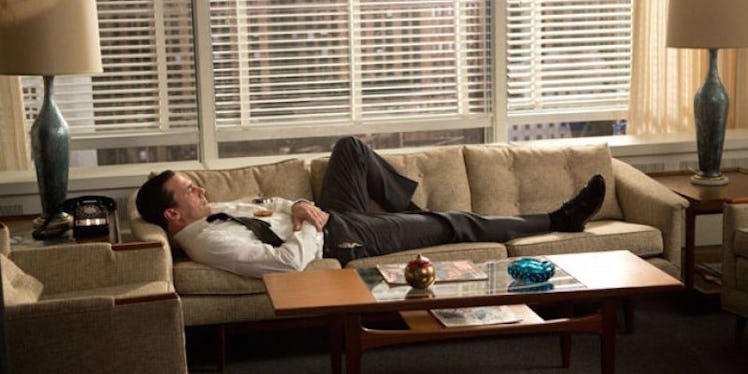
4 Legitimate Ways You Can Get Away With Taking A Nap At Work
We're all familiar with the after-lunch slump. It's that time each afternoon when exhaustion takes over, and it's hard to get any work done.
While most of us have learned to work through this fatigue — no matter how slowly — it's hardly the most productive time of day.
One reason we all struggle to get through the afternoon without a break is because, according to Professor Jim Home, our bodies are actually designed to sleep in two separate sessions, as opposed to one eight-hour stretch.
One part is your normal evening sleep, but the other rest period usually takes place in the early afternoon. That's why we see afternoon siestas in countries spanning from Spain to China.
Here in the United States, unfortunately, the afternoon nap hasn't really caught on, so you may have to get creative if you're going to grab some shuteye at work.
That's why we've devised these four strategies for fulfilling the need for sleep. You may just start an office-wide trend.
Talk To The Boss
If you're going to try to nap at work, consider having a sit-down with your boss to discuss the rationale behind it. First of all, making a regular – and noticed – habit of sleeping on the job won't do you any favors, and it may even put your job at risk.
The second reason you should talk to your boss is because many executives are changing their positions on the afternoon nap, all due to sleep gurus like Arianna Huffington.
Huffington, who has long offered a nap room in the New York City HuffPo offices, has written a book called “The Sleep Revolution,” which has been highly influential in the professional sector.
Offer an informed recommendation to your boss regarding why allowing for that nap benefits everyone. Make sure you're clear that you're seeking a short nap so you can work harder and smarter for the whole company's benefit.
Who knows? Your boss may be interested in implementing a nap room, too.
Nap Like An Astronaut
When napping on the job, it's important to sleep for a brief, efficient period of time. A power nap is typically defined as 10 to 15 minutes, but this may be a little short for some, so consider a NASA nap instead.
A 1995 study performed by NASA determined that 26 minutes is the optimal nap length for both alertness and overall performance. Plus, when you factor in how much time we all spend surfing the web and trying to stay awake, 26 minutes is a worthwhile investment.
Test out your perfect sleep number at home, and don't forget to find a good alarm system that will rouse you without disrupting the entire office. Many fitness trackers come with a vibration alarm, or you can set a discreet phone alarm.
Whatever you choose, make sure it won't be audible down the hallway and will actually rouse you, so you can get back to work.
Create Space
There's little benefit to napping if you're going to do so in an uncomfortable space. You'll just wake up feeling cranky and stiff.
Instead, get creative. If you've spoken to your boss about your new nap undertaking, see if you can use an empty conference room to stretch out for 20 minutes or stage a takeover of the lounge couch.
If you can't find a space like these to nap, then make sure to invest in a few simple things that will make napping more pleasant, such as a white noise machine to drown out office sounds and a sleep mask to ensure a dark sleep environment.
A sweatshirt with a large hood and a neck pillow, like the kind people use on planes, can also help you relax.
Pro tip: Reverse your neck pillow so that it supports your neck when it falls forward. Most people find this more comfortable, especially when in a high-backed desk chair.
Get Your Caffeine Boost
We usually think about having that cup of coffee to keep us awake, but coffee isn't magic. Well, at least not entirely.
That's why you should have your afternoon caffeine jolt just before you settle in for a nap. Since it takes a little while for the caffeine to get to work in your system, by the time you wake up, you'll feel not only rested, but you'll also feel energized.
If you wait to have your coffee until after your nap, you'll experience a lag between your initial rested state and the stimulation from the caffeine.
While executive culture in the United States still tends to glorify a lack of sleep, there are winds of change headed our way. Be the voice of change in your office, or just hunker down quietly for a quick rest – either way, by opening yourself to a brief afternoon nap, you're doing a beneficial thing for your body and your productivity.